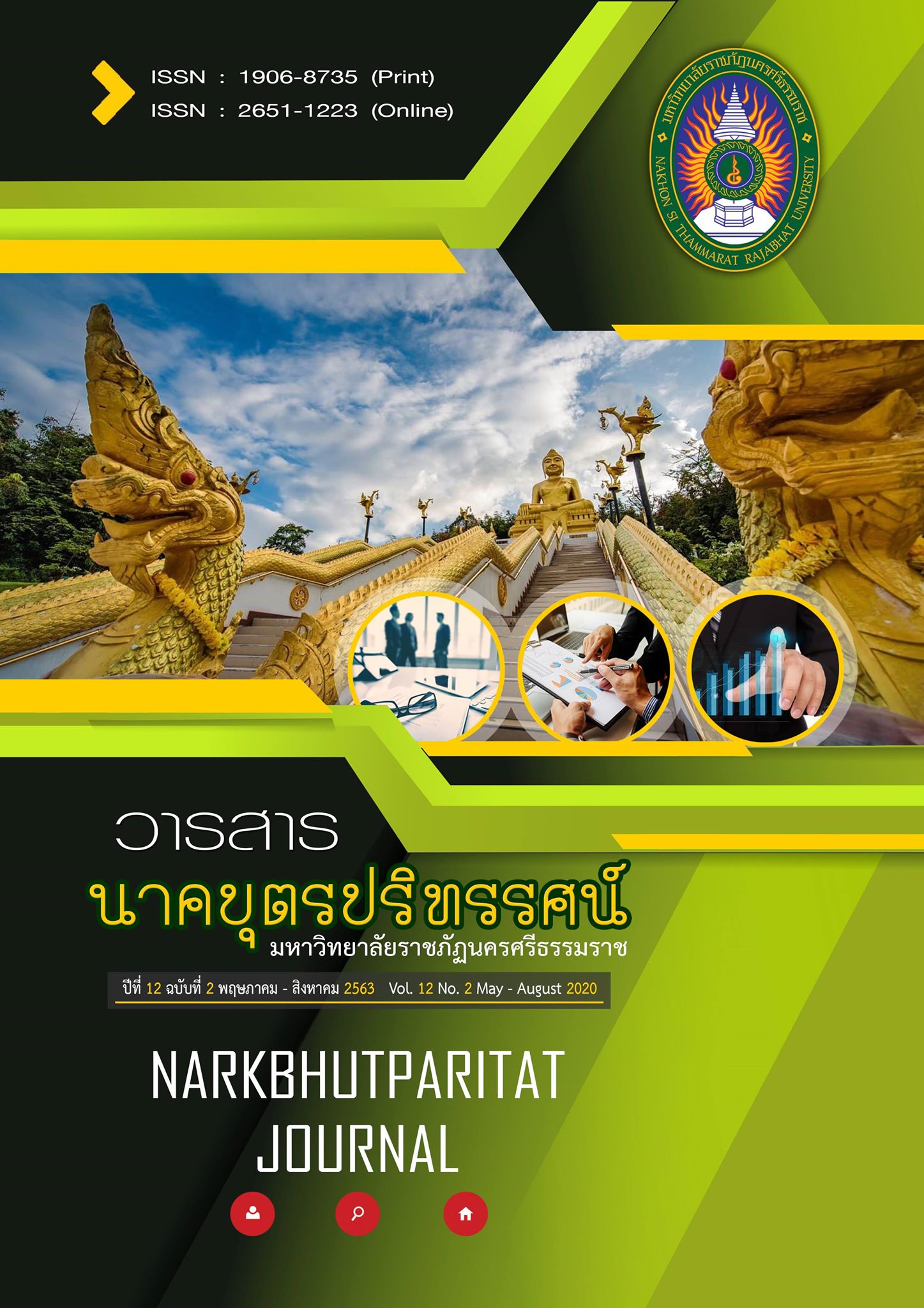การสังเคราะห์งานวิจัยเกี่ยวกับการกำกับตนเองในการเรียนรู้ของนักเรียน ระดับการศึกษาขั้นพื้นฐาน: การวิเคราะห์อภิมาน A RESEARCH SYNTHESIS OF SELF-REGULATED LEARNING OF BASIC EDUCATION STUDENTS : A META-ANALYSIS
Main Article Content
บทคัดย่อ
บทคัดย่อ
การวิจัยครั้งนี้ มีวัตถุประสงค์ของการวิจัยเพื่อ 1) ประเมินคุณภาพงานวิจัยเกี่ยวกับการกำกับตนเองในการเรียนรู้ของนักเรียนระดับการศึกษาขั้นพื้นฐาน 2) ศึกษาคุณลักษณะของงานวิจัยเกี่ยวกับการกำกับตนเองในการเรียนรู้ของนักเรียนระดับการศึกษาขั้นพื้นฐาน และ 3) วิเคราะห์อภิมานงานวิจัยเกี่ยวกับการกำกับตนเองในการเรียนรู้ของนักเรียนระดับการศึกษาขั้นพื้นฐาน ดำเนินการวิจัยโดยใช้กระบวนการวิเคราะห์อภิมาน กลุ่มเป้าหมาย ได้แก่ รายงานการวิจัยที่เกี่ยวข้อง ซึ่งตีพิมพ์ตั้งแต่ปี พ.ศ. 2541 – พ.ศ. 2560 จำนวน 14 เล่ม เครื่องมือในการวิจัยคือ แบบประเมินคุณภาพงานวิจัย แบบบันทึกคุณลักษณะงานวิจัยเชิงทดลอง และแบบบันทึกคุณลักษณะงานวิจัยเชิงสหสัมพันธ์ การวิเคราะห์ข้อมูลใช้สถิติบรรยาย ค่าขนาดอิทธิพลมาตรฐาน ค่าสัมประสิทธิ์สหสัมพันธ์มาตรฐาน และการวิเคราะห์ความแปรปรวนทางเดียว
ผลการวิจัยพบว่า
- ผลการประเมินคุณภาพงานวิจัยทั้งหมดจำนวน 14 เล่ม มีคุณภาพงานวิจัยรายเล่มวิจัยอยู่ในระดับสูงซึ่งคิดเป็นร้อยละ 85.71 โดยมีคุณภาพอยู่ในระดับสูง 18 ประเด็น
- ผลการศึกษาคุณลักษณะของงานวิจัย พบว่า งานวิจัยส่วนใหญ่เป็นงานวิจัยในระดับปริญญามหาบัณฑิต คิดเป็นร้อยละ 78.57 แนวคิด/ทฤษฎีที่นำมาใช้ในการวิจัยโดยส่วนใหญ่คือ ทฤษฎีการกำกับตนเองในการเรียนรู้ คิดเป็นร้อยละ 40 นวัตกรรมที่นำมาใช้ในการพัฒนาการกำกับตนเองในการเรียนรู้มากที่สุดคือ นวัตกรรมด้านการเรียนการสอน คิดเป็นร้อยละ 66.67 และมีการศึกษาปัจจัยที่สัมพันธ์กับการกำกับตนเองในการเรียนรู้ครอบคลุมทั้ง 3 ด้าน คือ ด้านบุคคล ด้านพฤติกรรม และด้านสิ่งแวดล้อม
- ผลการวิเคราะห์อภิมานงานวิจัย พบว่า นวัตกรรมที่มีความสัมพันธ์กับการกำกับตนเองในการเรียนรู้สูงที่สุด คือ การจัดการเรียนรู้ตามแนวคิดการสืบสอบและการรู้คิด ซึ่งมีค่าสัมประสิทธิ์สหสัมพันธ์มาตรฐานเท่ากับ 0.741 ปัจจัยที่สัมพันธ์กับการกำกับตนเองในการเรียนรู้สูงที่สุดคือ การคิดอย่างมีวิจารณญาณ (ด้านบุคคล) ซึ่งมีค่าเท่ากับ 0.923 และตัวแปรที่มีผลทำให้ค่าเฉลี่ยสัมประสิทธิ์สหสัมพันธ์แตกต่างกันอย่างมีนัยสำคัญทางสถิติที่ระดับ 0.05 คือ ปีที่พิมพ์ และจำนวนแนวคิดทฤษฎี
Article Details
เอกสารอ้างอิง
Bandura, A. (1986). Social foundations of thought and action: A social cognitive Theory.
New Jercy: Prentice-Hall.
Cheisuwan, C. (2013). Factors affecting self-regulated in mathematics learning of students in
the United Campus Aphirom Ruedi Group, Secondary Educational Service Area Office 9
(M.Ed. Thesis). Ramkhamhaeng University. (in Thai)
Christopher, A. W. (2010). Self-Regulated Learning and the 21 Century Competencies.
(Doctor of Philosophy Thesis in Educational Psychology). Graduate school University of
Houston.
Cooper, H. and Hedges, L. V. (1994). The handbook of research synthesis. New York: Sage.
Glass, G. V., McGraw, B., and Smith, M. L. (1981). Meta-Analysis in social science research.
Beverly Hill: Sage Publications.
Hedges, L. V., and Olkin, I. (1985). Statistical methods for meta-analysis. California: Academic.
Jenkins, J. S. (2009). The effects if explicit self-regulated learning strategy instruction on
mathematics achievement. (Doctor of Philosophy Thesis in Curriculum and Instruction).
Graduated school of University of North Carolina, America.
Jongjairusatham, S. (2016). The combination of the multidisciplinary factor approach of self-
regulation in mathematics learning influencing on the mathematical achievement of
Mathayom Suksa Three Students. (Doctor of Science Thesis). Srinakharinwirot University,
Faculty of Applied Behavioral Research. (in Thai)
Namrak, U. (2012). Some factors affecting self -regulated learning of MathayomSuksa Four
Students under the jurisdiction of the office of secondary education area 28. (Master of
Education Thesis). Srinakharinwirot University, Faculty of Educational Research and
Statistics. (in Thai)
Pintrich, P. R. (2000). The role of goal orientation in self-regulated learning: In M.
Boekaerts, P. R. Pintrich, & M. Zeidner (Eds.). Handbook of self-regulation (p. 451–502).
Thummaphun, P. (2011). The effect of using the self-regulated program with teacher 's social
support on learning behavior of elementary school students with lower learning
achievement. (Doctor of Science Thesis). Srinakharinwirot University, Faculty of Applied
Behavioral Research. (in Thai)
Srisathitnarakoon, B. (2007). Research methodology in nursing (4th ed). Bangkok: U&I
InterMedia. (in Thai)
Wiruschai, N. (1999). Meta-analysis. Bangkok: Department of Educational Research,
Chulalongkorn University. (in Thai)
Wonglorsaichon, P. (2012). Research and development of a strategy manual for promoting
self-regulated learning strategies in the online learning context of university students by
designing data collection online. (Doctor of Education Thesis). Chulalongkorn University,
Faculty of Educational Research Methodology. (in Thai)
Zimmerman, M.-P. (1990). Student Differences in Self-Regulated Learning: Relating Grade, Sex,
and Giftedness to Self-Efficacy and Strategy Use. Journal of Educational Psychology,
(1), 51-59.


